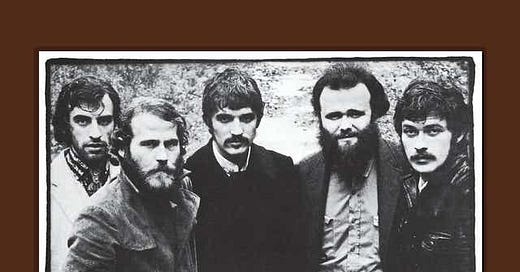The smell of the leaves, from the magnolia trees in the meadow
The Band - 'King Harvest (Has Surely Come)' (The Band - 1969)
To quote someone else, Is it gettin' heavy? The last few tracks we’ve featured on The Run Out Grooves have been quite severe in subject matter; Drug addiction, the role of the patriarchy, quasi-legal gambling boats and most recently, parental abandonment from Jeff Buckley’s Grace.
Fortunately, The Band are on hand to provide a little levity with the tale of an impoverished farmer, fresh from the failure of his crops, hoping a union organiser can help him through to better days.
This roots-rock finale features Richard Manuel singing the lead and Garth Hudson providing the famous Lowery organ1 sound that punctuates many of their songs. Although Levon Helm claimed that ‘King Harvest’ was a group effort, the song is credited to guitarist Robbie Robertson.
Robbie Robertson has said;
The chord progression was a little bit complex. There's a sifty feeling we were trying to get, which was subtle and bold at the same time.
It does have a complex arrangement when you sit and unpick it; it’s not in an odd time signature like ‘Jawbone’ earlier on The Band is, but it is unusual to have the chorus more downbeat than the verses as well as the second and third instances having different lyrics to the first and final. It is almost if we are hearing two songs at once; the naive lyrics to the verse and the weary chorus are a dramatic switch that the music pivots between with minimal fuss from the drumming as the rest billows around them.
Like some of the other standouts on The Band’s self-titled second album, it is a first-person character piece set in the annuals of American history that led some to discuss the album if it was a concept album. I’m not sure that claim fully stands up beyond ‘Jawbone’, ‘The Night They Drove Old Dixie Down’ and ‘King Harvest’ - but I can see how they went from covering ‘Long Black Veil’ on their first album to delving into that world more.
The historical context of this track is quite likely to be the organising drives of the Trade Union Unity League for share-cropper union members in the U.S. South before and during The Great Depression. The song is centred on the plight of an unfortunate farmer who has to contend with the dry, dusty summers of the early thirties across the US Great Plains, which would have brought him close to ruin without his barn burning down and his horse, Jethro, going mad. Although the union boss arrives with a smile and claims to be his friend, he will ultimately take advantage of him just as much as the landowner. Going on strike will not save him from the landowner’s hired goons when those crops fail again.
Between the social commentary/history lesson and the arrangement - you can hear that Robbie Robertson is channelling John Steinbeck’s The Grapes of Wrath, you can see why the likes of Greil Marcus has suggested it as “Robertson's finest song and the best example of the group's approach to songwriting and performing” and a fitting end to one of Canada’s most remarkable explorations of the dusty underbelly of their southern neighbours2.
You can also hear a Lowrey Organ on The Beatles’ ‘Being For The Benefit of Mr Kite’ and ‘Lucy In The Sky With Diamonds’ from Sgt. Pepper and on The Who’s ‘Baba O’Riley’
Herb Bowie takes an even greater sweep of rock history over at Reason To Rock and delves into King Harvest in much more detail.







I love the pocket in this tune. All hail Levon.
If you have a chance, check out "The Last Waltz." It's a film/documentary about their last concert, and it's fantastic.